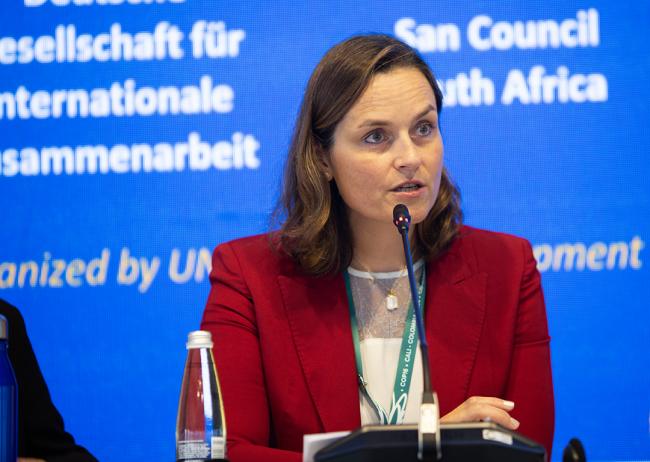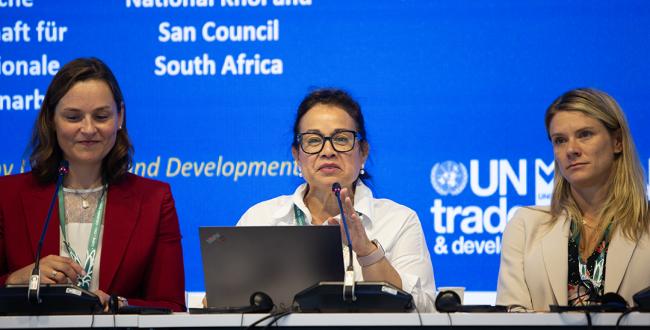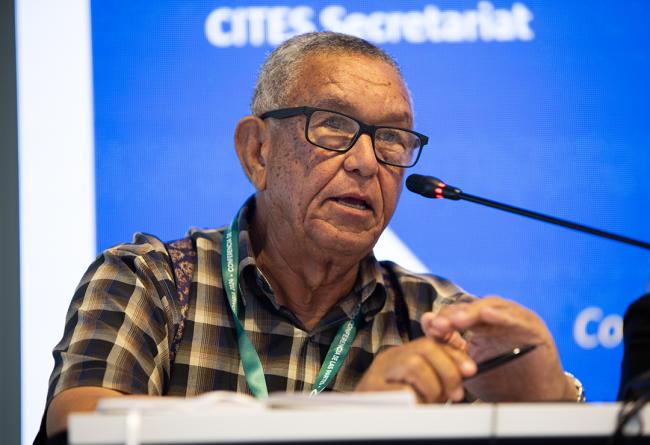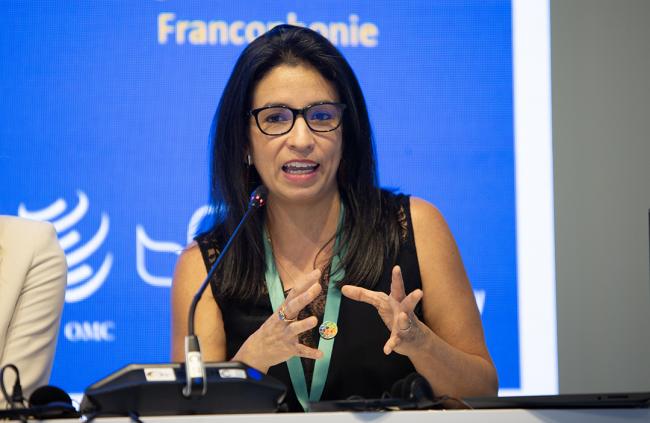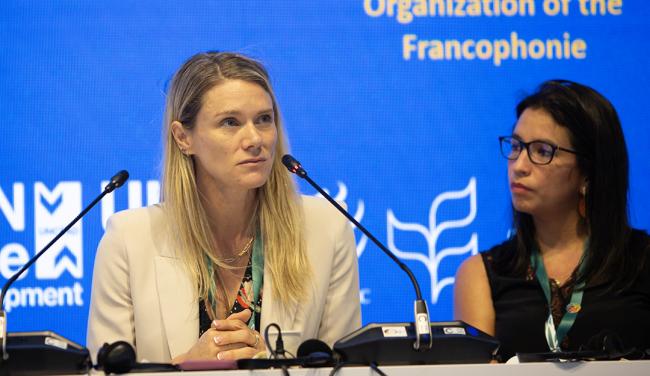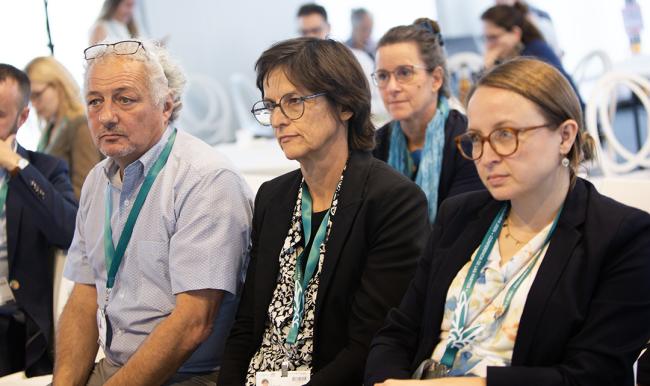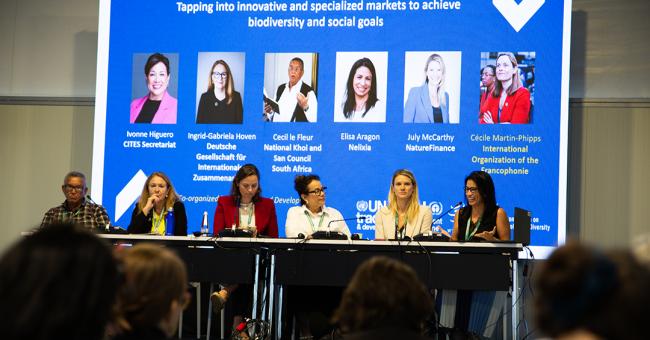About
This event was the final session of Trade Day, which focused on the relationship between international trade and biodiversity conservation. Presentations and discussions addressed how sustainable trade can foster resilient livelihoods, improve community well-being, and conserve biodiversity.
Moderator Cecile Martin-Phipps, International Organization of the Francophone, introduced the session, noting the potential for sustainable trade to create resilient livelihoods and improve living conditions, while preserving and restoring biodiversity.
Ivonne Higuero, Secretary-General, Convention on International Trade in Endangered Species of Wild Fauna and Flora (CITES), said biodiversity-based products are not just commodities—they represent a lifeline for millions—and that we sometimes forget to understand how livelihoods are impacted by biodiversity conservation. She offered successful examples where the unsustainable trade and harvest of CITES-regulated species were transformed into successful businesses that provide income and employment for local people. She highlighted the importance of management plans, training programmes, traceability procedures, addressing the priorities of local communities, and fostering social inclusion at every step of the way.
Ingrid-Gabriela Hoven, Managing Director, Germany Corporation for International Cooperation (GIZ), emphasized integrating biodiversity conservation with sustainable trade and social equity. She shared GIZ’s approach to empowering Indigenous communities to fulfill international market requirements, while also working to reduce market barriers to trade in natural ingredients and products. She described a GIZ project that has successfully supported more than 20 African-European biodiversity-based business partnerships.
Cecil Le Fleur, Chairperson, National Khoi and San Council, South Africa, shared the experience of the Khoi San Peoples successfully negotiating a “groundbreaking” worldwide benefit-sharing agreement for trade in rooibos, a plant that is endemic to the Cederberg Mountains. He said they were proud their Indigenous knowledge and plants were suddenly in demand worldwide. He also stressed the inclusion of non-monetary benefits, including education, that help uplift the community and provide opportunities for young people to become entrepreneurs and business owners. He said lessons from the rooibos agreement led to an agreement for buchu, a plant valued for medicinal purposes.
Elisa Aragon, Co-Founder and CEO, Nelixia, shared her company’s experience in Paraguay working with small-scale farmers to sustainably produce natural ingredients for perfume, cosmetics, spices, and herbs. She described implementing a management plan for the harvest of gaicwood from the El Chaco region that was focused on avoiding disturbance to the biodiversity, along with the adoption of standards to improve the living conditions of the workers. She also noted the difficulty of monetizing sustainability standards and advocated for a new bioeconomy.
Julie McCarthy, Co-CEO, NatureFinance, noted a huge growth in different financial instruments and tools to support financing biodiversity and the broader Kunming-Montreal Global Biodiversity Framework (GBF) goals. She stressed the importance of digital sequence information on genetic resources (DSI) of species taken from their home countries, which are used to generate extraordinary profit, but not for the host communities. She highlighted other financial innovations to support biodiversity-driven industries, including sustainability-linked debt instruments, debt-for-nature swaps, and conservation-outcome bonds. She described a project in West Africa that links a performance indicator on forest conservation to reduced interest rates, and lauded efforts by Brazil and South Africa to develop bioeconomy strategies.
During ensuing discussions, speakers commented on: the capacity of communities to negotiate agreements; potential tax incentives and practices that protect the private sector; the importance of certifications; consumer education and communication strategies; replication of successful models; economic strategies linked to climate and biodiversity commitments; and prioritizing public investment in sectors that are delivering simultaneous benefits from climate, nature, and people.
Organizers: UNCTAD, WTO, CBD, UNEP, GIZ
Contacts:
Chantal Line Carpentier, UNCTAD biotrade@un.org
Lorena Jaramillo, UNCTAD lorena.jaramillo@un.org
Ivana Padierna, UNCTAD ivana.padiernadominguez@un.org
Svetlana Chobanova, WTO svetlana.chobanova@wto.org
Bianca Brasil, CBD Secretariat Bianca.lisboadacamarabrasil@un.org
Hirotsugu Takahashi, CBD Secretariat Hirotsugu.takahashi@un.org
Balakrishna Pisupati, UNEP Balakrishna.pisupati@un.org
Beatriz Fernandez, UNEP Beatriz.fernandezhernandez@un.org
For more information: https://unctad.org/system/files/information-document/cop16-trade-day-draft-concept_vs4oct-updated.pdf
To receive free coverage of global environmental events delivered to your inbox, subscribe to the ENB Update newsletter.
All ENB photos are free to use with attribution. For the 2024 UN Biodiversity Conference, please use: Photo by IISD/ENB | Angeles Estrada Vigil

